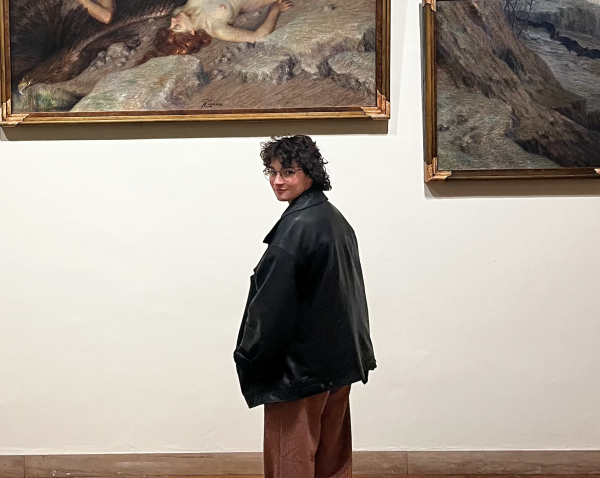St. Paul to Havana: Macalester musicians collaborate with CAYO
February 16, 2023
Macalester’s Aurora String Quartet — composed of violin players Roan Floer-Martinez ’23 and Elisa Gehrke ’24, viola player Olivia Laske ’24 and bassist Ryan Chu ’24 — and their instructors, professors James Garlick and Tom Rosenberg, recently showed us one vision of how music can transcend international borders in their trip to Havana, Cuba from Jan. 15 through Jan. 23.
The group met the ELXUS String Quartet from the Instituto Superior de Arte school of music in Havana. Together, the two groups participated in the Cuban American Youth Orchestra’s (CAYO) Ambassadors Program. Additionally, a professional Cuban string quartet and other American musicians joined the trip.
Founded by Dr. Rena Kraut in 2016, CAYO has been facilitating exchanges between Cuban and American musicians since 2017.
“[CAYO is about] exchange of cultures and music, and not politics to show [Cuban] people are wonderful and [many American] people are wonderful, or can be,” Rosenberg said. “[We] believe in peace and communication and [that] sharing our cultures is good.”
Although Chu, a music minor, is the only member of the string quartet who has a declared major or minor in music, members of the ELXUS Quartet have been music students for much of their academic careers. The groups performed at the residence of Benjamin Ziff, the Chargé d’Affaires of the United States embassy in Havana.
“I remember thinking before our first piece that we played, that this was by far the most high stakes concert I’d ever played,” Floer-Martinez said. “I think that that was something that was pretty shared, at least among the American [students], and probably to a lesser extent, among the Cuban [student] quartet as well.”
While Ziff’s residence may have been the highest stakes location that the group performed at, many performers noted that their most memorable musical connections developed at other events.
Gehrke has been teaching violin for over five years, but she shared that teaching musicians at an elementary school was one of her most impactful teaching experiences. In contrast to many young music students from the U.S., many Cuban music students must test into programs at a certain age.
“I think going to the elementary school was my favorite part just because I think live music [is] just super important,” Gehrke said. “And [it’s] super valuable to see all that passion and excitement about playing together and making music together. And I think everyone found it really valuable to get a new perspective … I think it was just really beautiful to see so many young kids so excited to play.”
In addition to teaching and playing alongside Cuban musicians, professors donated pieces of music, stands and other resources to Cuban music programs. Rosenberg personally left a cello and case for the Instituto Superior de Arte.
Gehrke stated that although she was surprised by the conditions in the schools, which Rosenberg described as “pretty grim,” Gehrke learned from the musicians’ persisting passion for music.
“I think the lesson that I’ll take is: if you really have a drive and have the passion for something, you could definitely make it happen,” Gehrke said.
Floer-Martinez expressed similar sentiments, as well as appreciation for seeing an authentic representation of Cuba. After decades of tension and a series of U.S.-imposed economic sanctions, the U.S. still bans tourist travel to Cuba. However, individuals may visit Cuba for academic purposes, among other reasons.
During the trip, Macalester students were able to travel to some of the spaces that Instituto Superior de Arte students found significant.
“Getting [Instituto Superior de Arte students] to kind of show us around Havana and having them really take us to what they would do and where they would go was much more eye-opening than any ‘touristy trip’ could have been,” Floer-Martinez said. “And that would not have happened if we hadn’t had that first connection through playing together.”
This April, members of the ELXUS String Quartet and other Cuban musicians will come to the Twin Cities through the CAYO Ambassadors Program. The ELXUS String Quartet will perform alongside the Aurora String Quartet at the Chamber Ensembles Concert in the Mairs Concert Hall on April 23 from 3 p.m. to 5 p.m.
Musicians from both Cuba and the U.S. hope that this experience can continue fostering cultural diplomacy.
“[Cultural diplomacy] means building connections with people, between our country and Cuba, connecting the humans, connecting the artists, musicians,” Garlick said. “We have so much to share and teach each other … The opportunity for an incredible human to human exchange is really remarkable.”














